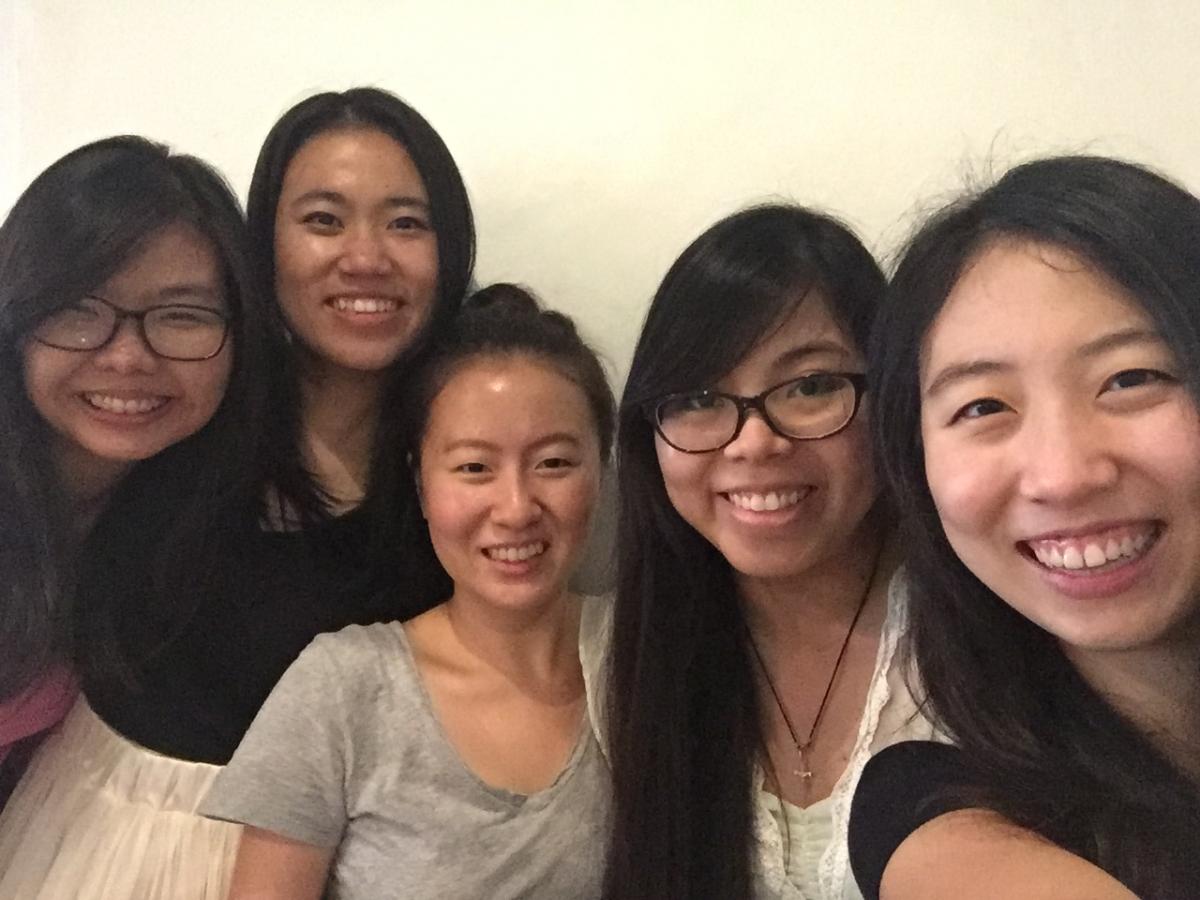Hi! First off, if you’re reading this page in preparation of applicant day, congratulations on getting an interview! I’m Sam, currently in 2nd year and going through clinical rotations. I majored in Physics in the University of British Columbia and now I’m back in Singapore to pursue medicine. Here are some tips for applicant day that I’d like to share, categorized to pre-applicant day, applicant day and post-applicant day.

A few of us in our white coats
Pre-Applicant Day:
You’ve received an email or letter saying you have gotten an interview- rejoice! You’ve worked so hard throughout the last several years, and now you’re a step closer to pursuing medicine. An applicant day package will be sent out to you a few weeks before the applicant day itself. Take some time out to read the journal article they send you, it will make for a more interesting and engaging discussion when you are grouped with other applicants on the day itself. Reflect on why you decided to pursue medicine, and what you have done or seen that jumpstarted your interest – whether it was through your interactions with people that brought you to this path. Try not to stress yourself too much, an interview means the school is clearly interested in you, so show them the person they have been reading about in the application essays. You can prepare by looking at typical interview questions and practicing them (I’ll talk more about this later in the applicant day section). There are loads of interview questions roaming around the internet, so you can start off by familiarizing yourself with them. It may also be useful to think about key events in your life/volunteer/working experience that has shaped you and your goals.
Side note: Remember to get all your verification documents ready in advance so you don’t go scrambling at the last minute.
Applicant Day:
Applicant day is further broken up into a mock-TeamLEAD, an interview process, situational judgement test, and a few other segments in-between. A brief introduction to the school is generally provided before diving off into a mock-TeamLEAD session. You’ll be grouped with 2-3 more individuals for TeamLEAD and discussion sessions that will occur later during the day.
In the TeamLEAD component, you’ll be given a short quiz on the article that was sent out to you in the applicant-day package (it’s not for marks, so don’t be disheartened if you can’t get everything right). After which, you’ll discuss in your teams regarding the same questions on the quiz. The point here is for you guys to challenge each other and generate critical thinking. The moderator will then facilitate another question for you and your team to further discuss. This segment was one that I was looking forward to during my applicant day, as it gave me a better idea of what the rest of the school year would look like. Listening about the ideas others have brought forward new perspectives that I have failed to consider. So take the opportunity to share your ideas with your group during the applicant day, who knows you’ll be teamed up with the same people again when you start school. My teammate in applicant day later became my teammate for rest of the school year.
It’s time for interviews! You’ll most likely be meeting with a clinician and a researcher. The questions asked may be broad and varied. It may range anywhere from questions about you- your interests and hobbies, about what has motivated you towards the pursuit of medicine, or hearing your thoughts on common ethical dilemmas.
Personal questions are always the easiest to answer. This is where you show your interviewer who you are! However, over-practicing these questions can do you a great disservice, as a person can seem insincere when the rhetoric sounds too rehearsed. So for these questions, take a deep breath, keep calm and you’ll perform.
I personally fear ethical dilemma questions, there are no black and white answers (essentially, welcome to the world of medicine). However, it is important to bear in mind, it is your thought process and evidence you can provide to support a stance that is more pivotal than your actual position on the dilemma. For me, practicing is key in helping me relieve some anxiety. Think about common ethical dilemmas and practice arguing for one stance over another to a friend and see if you can convince them with your argument. Stay up to date with key medical issues, debacles and policies: what is your opinion regarding these issues? What motivates certain medical policies? What do you see are potential problems with our healthcare system? These may not be questions you get during the interview, but is good to start developing an awareness and interest in our healthcare scene if you haven’t already.
During the day, there will also be a lunch with current students and faculty present to talk to you. Take the opportunity to chill and relax your brain before you start your next component. Talk to students and faculty to get a better understanding of student life and the school.
After Applicant Day:
Now you can officially relax, there’s nothing else you can do at this point. Once you start medical school, you’ll either be constantly buried in books, or the hospital will be your new home. So thoroughly enjoy yourself the best as you can!
Good luck for your applicant day, I hope to meet you soon.

Me (2nd from left) and some of my classmates
By: Samantha Tan, Class of 2019